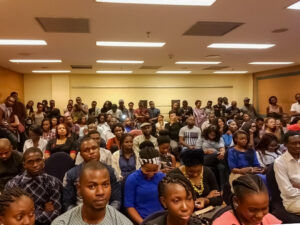In Nigeria and other parts of Africa, performance poetry and literary societies are evolving into informal civic arenas—spaces where art serves as a tool for political reflection. From library corners to public parks, these gatherings are quietly reshaping civic discourse on the continent.
By Bonface Orucho
Scrolling through the Enugu Literary Society’s (ELS) Instagram page reveals a collage of microphones, bold typefaces, book-lined walls, and expressive faces.
A flier for the then-upcoming Arts & Literary Festival bursts in gold, featuring a clenched fist rising from a fountain pen. Another post promotes an open mic session, the silver head of a mic gleaming like a spotlight.
Post after post reveals a pattern. A growing movement is merging art and argument as young Nigerians carve out space to speak their truths.
Each week, in a modest library hall in the southeastern Nigerian city of Enugu, creative energies burst forth from among the literary society’s attendants.
“It was never just about poetry,” said Dr Ken Ike Okere, a cultural innovator who founded the Abuja Literary Society (ALS) in 1998 and later established the Eko Literary Society in Lagos and ELS in Enugu. “From the beginning, it was about finding a space where we could think out loud, challenge ourselves, and—eventually—engage our country.”
Okere recalled the early days of ALS as almost accidental. “Abuja in the late ’90s was sterile,” he said about the Nigerian capital city. “It was a government city, and after work on Fridays, everyone fled. All we had were drinking joints. We wanted more.”
From informal book discussions in a friend’s office, ALS grew into a community that regularly drew more than 100 people to its weekly gatherings.
Over the years, the platform became a springboard for emerging voices—among them Elnathan John and Abubakar Adam Ibrahim—who began by reading at open mics and later rose to literary prominence through awards and international residencies.
Elnathan John, a Nigerian novelist, satirist, and lawyer, gained acclaim for his novel Born on a Tuesday, for which he won the Betty Trask Award.
Nigerian writer and journalist Abubakar Adam Ibrahim achieved recognition with Season of Crimson Blossoms, which won the 2016 Nigeria Prize for Literature. His fiction—spanning titles like The Whispering Trees and Dreams and Assorted Nightmares—delves into intimacy, power, and northern Nigerian life with a voice that resonates far beyond the region.
In the formative years of their literary careers, John and Ibrahim regularly attended Abuja Literary Society’s gatherings, which featured book review sessions, poetry slams and robust dialogue on civic matters.
While several participants of Okere’s initiative have gone on to win literary awards, for him, success isn’t measured in accolades. “If our space helped someone unlock their voice, feel heard, feel transformed—that was enough,” he said. “That is the real impact.”

In the past decade, Nigeria’s civic space has faced threats from state and federal government regimes.
According to CIVICUS Monitor, a research tool, Nigeria’s civic space is rated as “repressed,” citing crackdowns on protests, arbitrary detentions, and shrinking freedom of assembly. Youth trust in government continues to decline.
An Afrobarometer report from 2022 noted that only 26% of Nigerians aged 18–35 trusted elected officials “a lot” or “somewhat.”
In this environment, literary societies are emerging as alternative arenas for civic participation—less confrontational, more introspective, but no less engaged.
“When you come to ALS or ELS, you aren’t just entertained,” said Okere. “You are invited to think. And we don’t end with applause. We critique. We analyse. We ask, ‘What does this say about us?’ “
The approach is intentional. Readings are often followed by discussions that dissect not just form and metaphor, but relevance and political subtext.
Some societies themed their gatherings around civic issues such as corruption, elections, and gender-based violence. In 2004, Okere organised Nigeria’s first poetry slam. Since then, themed slams have become a fixture.
While these platforms are filling gaps left by weakening institutions, they are not being framed in opposition.
Okere explained that they were creative responses to structural limits. The goal was not to replicate town halls but to reinvent them.
“Young people came because they wanted to speak,” said Okere. “But more importantly, they wanted to feel safe while doing so. We had shy medical students come in and leave wanting to be playwrights.”
Johnson Onyedikachi, the winner of the 2024 ELitFest Slam held in Enugu, embodies this transition.
“I wasn’t sure anyone would listen,” he explained. “But when I stood on that stage, I realised I wasn’t alone. People clapped, but more than that, they responded. That’s what made it different.”
Attendance keeps rising. At the Enugu Literary Society, weekly participation has grown from 30 to over 100 since 2022. And these gatherings are becoming increasingly diverse.
“We had students, lawyers, engineers, even clergy,” Okere noted. “The only common denominator was the need to express and connect.”
Yet, this is not just a Nigerian phenomenon.
The Ehalakasa Movement, founded by poet Sir Black in Ghana, has built a nationwide network of slam events and creative writing workshops.
“Ehalakasa means ‘the song of the people’ in Ga,” said Sir Black in an interview with OkayAfrica. “We used poetry to connect, to teach, and to protest.”
Poets such as Batsirai Chigama in Zimbabwe have turned to verse to confront land reform, gender injustice, and political repression. Across the border, platforms like South Africa’s ‘Word N Sound’ continue holding space for critical expression, even under the shadow of censorship.
Kenya’s creative scene is also prominently pushing art to the forefront of civic resistance. Spoken word performers and poets are staging pop-up acts in matatus, public parks, and street corners—transforming everyday spaces into theatres of protest and reflection.
“Through the use of placards bearing messages such as ‘How do you teargas a baddie?’ and banners, youth protestors leveraged various TikTok trends to amplify their message and keep people worldwide informed,” Rose Musyoki wrote in the Art Network Africa.
Common among these groups is their dual function: they are both artistic and civic. They provide structure without hierarchy, critique without hostility, and participation without bureaucracy.
The influence of these spaces spreads. Societies modelled after ELS have cropped up in other Nigerian cities: Aba and Kaduna.
In 2021, ELS partnered with the West Africa Broadcast and Media Academy (WABMA) to launch a media literacy campaign in 17 Nigerian states. Over 2,200 youth were trained on how to detect fake news and misinformation through poetry.
“We ended that campaign with a national poetry competition,” Okere shared. “The entries were stunning—young people using verse to interrogate digital truth.”
There is no central funding body, no national literary society union. Most groups are run by volunteers. But the network is expanding, linked by WhatsApp, Instagram, and word of mouth.
Okere sees potential in a pan-African network but cautions against premature formalisation.
“These things grow best when they’re allowed to breathe,” he said. “But yes, we should be talking across borders. Literature doesn’t stop at customs.”
When asked what the success of these literary spaces looks like, Okere believes it isn’t policy change or media coverage.
“Success is when a quiet young person reads something and leaves believing their voice matters,” he said. “Because that belief is the foundation of every functional society.”
bird story agency
In Nigeria and Africa, performance poetry and literary societies are transforming into informal civic spaces where art acts as a medium for political engagement. Organizations like the Enugu Literary Society (ELS) and Abuja Literary Society (ALS) provide a platform for young Nigerians to voice their perspectives, blending art with discourse in response to the country’s "repressed" civic space. Established by Dr. Ken Ike Okere, these initiatives foster creativity and civic participation, offering alternative arenas for dialogue in an environment of distrust towards government institutions.
These literary societies, active across Nigerian cities, engage attendees in discussions that extend beyond artistic expression to involve civic matters such as corruption and elections. The initiative goes beyond Nigeria, with similar movements in Ghana, Zimbabwe, South Africa, and Kenya fueling civic expression and resistance through art. The societies value unlocking individual voices and promoting a sense of belonging, reflected in their growth without centralized funding or bureaucracy. Their impact is seen in empowered individuals, some of whom, like Johnson Onyedikachi, take center stage feeling heard and connected.
These platforms, now expanding their networking through digital means, aim to maintain an informal yet impactful exchange of ideas, prioritizing personal empowerment over formalized structures. While the dream of a pan-African network exists, these societies prize organic growth over premature organization. The ultimate goal remains to inspire individuals to believe in the power of their voices, a crucial element in building functional societies.






